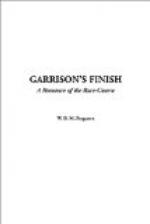But with Waterbury it was a different proposition. Garrison was unaware what his own relations had been with his former owner, but even if they had been the most cordial, which from Major Calvert’s accounts they had not been, that fact would not prevent Waterbury divulging the rank fraud Garrison was perpetrating.
The race-track annual had said Billy Garrison had followed the ponies since boyhood. Waterbury would know his ancestry, if any one would. It was only a matter of time until exposure came, but still Garrison determined to procrastinate as long as possible. He clung fiercely, with the fierce tenacity of despair, to his present life. He could not renounce it all—not yet.
Two hopes, secreted in his inner consciousness, supported indecision. One: Perhaps Waterbury might not recognize him, or perhaps he could safely keep out of his way. The second: Perhaps he himself was not Billy Garrison at all; for coincidence only said that he was, and a very small modicum of coincidence at that. This fact, if true, would cry his present panic groundless.
On the head of conscience, Garrison did not touch. He smothered it. All that he forced himself to sense was that he was “living like a white man for once”; loving as he never thought he could love.
The reverse, unsightly side of the picture he would not so much as glance at. Time enough when he was again flung out on that merciless, unrecognizing world he had come to loathe; loathe and dread. When that time came it would taste exceeding bitter in his mouth. All the more reason, then, to let the present furnish sweet food for retrospect; food that would offset the aloes of retribution. Thus Garrison philosophized.
And, though but vaguely aware of the fact, this philosophy of procrastination (but another form of selfishness) was the spawn of a supposition; the supposition that his love for Sue Desha was not returned; that it was hopeless, absurd. He was not injuring her. He was the moth, she the flame. He did not realize that the moth can extinguish the candle.
He had learned some of life’s lessons, though the most difficult had been forgotten, but he had yet to understand the mighty force of love; that it contains no stagnant quality. Love, reciprocal love, uplifts. But there must be that reciprocal condition to cling to. For love is not selfishness on a grand scale, but a glorified pride. And the fine differentiation between these two words is the line separating the love that fouls from the love that cleanses.
And even as Garrison was fighting out the night with his sleepless thoughts, Sue Desha was in the same restless condition. Mr. Waterbury had arrived. His generous snores could be heard stalking down the corridor from the guest-chamber. He was of the abdominal variety of the animal species, eating and sleeping his way through life, oblivious of all obstacles.
Waterbury’s ancestry was open to doubt. It was very vague; as vague as his features. It could not be said that he was brought up by his hair because he hadn’t any to speak of. But the golden flood of money he commanded could not wash out certain gutter marks in his speech, person, and manner. That such an inmate should eat above the salt in Colonel Desha’s home was a painful acknowledgment of the weight of necessity.




